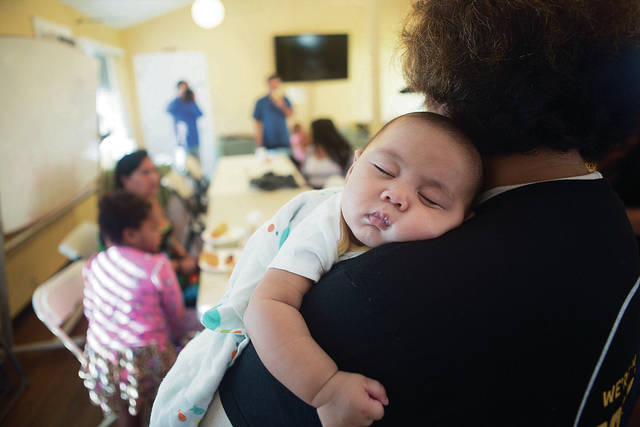Church domes in Kahaluu provide sanctuary for homeless single mothers

JOSHUA ZATECKA / SPECIAL TO THE STAR-ADVERTISER
Maio Weeks, 3 months old, slept on the shoulder of a church staff member Saturday after having eaten with her mother, Candice Moore, at the First Assembly of God’s “Igloo Christmas” in Kahaluu.
Mothers and their children who had been homeless just days ago this Christmas will wake up in new beds in a place where they can reboot their lives.
The children received their first presents of the season Saturday morning at the First Assembly of God’s 3-week-old project in Kahaluu.
|
PHOTO GALLERY: The First Assembly of God “Igloo Christmas party” Opens in a new tab |
The dozen 314-square-foot, 12-foot-tall, prefab homes that sprang up along Kamehameha Highway and Ahuimanu Road have been called lots of things: igloos, domes, dinosaur eggs and golf balls.
But Klayton Ko, senior pastor and the district superintendent of more than 100 Hawaii Assembly of God congregations, had a specific reason for calling the project The Shelter.
“In the Bible it says the Lord wants to be a shelter to those in need,” Ko said.
Don't miss out on what's happening!
Stay in touch with breaking news, as it happens, conveniently in your email inbox. It's FREE!
To Shana Alvarado, 42, and her children, their dome represents their first real home in years and a chance for a fresh start.
A year ago today Alvarado was addicted to drugs, living in Crane Community Park in Moiliili, and her children were taken away on Christmas Day.
“That was the worst Christmas ever when my kids got taken,” the mother of five said Saturday as Justin, 9, and La‘uanna, 5, opened presents donated to the Institute for Human Services. Three of her other children are living on the mainland.
Alvarado said she’s been clean and sober for nearly a year after she lost her children.
After waking up for the first time in their newly furnished dome, Alvarado and her children were greeted with a breakfast of fruit and pastries, a prayer from Ko and Christmas presents presented by IHS spokesman Kimo Carvalho, who filled in for Santa Claus wearing a ball cap, T-shirt and rubber slippers.
Of all of the Oahu projects that house the homeless — many of them run by IHS — The Shelter is aimed at a specific homeless demographic: single mothers with up to four children who must be clean and sober and able to pay rent of $200 a month, which in some cases comes from welfare payments or minimum- wage jobs.
No adult males are allowed. The families must adhere to faith-based rules, attend religious services and undergo case management by IHS social workers to address issues from financial literacy to child rearing.
The first family moved into The Shelter on Dec. 8. Two women with babies who spent their first night at The Shelter on Friday had just moved out of a domestic violence shelter in Kailua.
By Saturday seven mothers and their children were still settling into their new domed homes, and two more families were en route.
The plan is to have families stay no longer than nine months to give them a goal to recalibrate and better prepare them for the next stage of their lives.
Two of the 12 domes are divided into bathrooms with showers. Another is used for the on-site resident manager.
And there’s already a waiting list for people to get into the nine domes reserved for once-homeless clients.
The domes cost $10,000 each and come from Alaska. Other churches chipped in to buy some of them, said Pastor Daniel Kaneshiro, who is in charge of the project.
In all, First of Assembly of God received $500,000 in cash donations. But The Shelter actually cost much more, although Kaneshiro and Ko could not estimate the value of all of the donated labor and materials, including plumbing and electricity.
Pastors Ko and Kaneshiro imported their original Alaska dome to First Assembly of God’s church in Moanalua in 2015, where it sat as a symbol of what was to come for First Assembly’s buildings and land in Kahaluu.
The original dome has since been shipped around the islands so other churches and government leaders can touch and feel what might be possible in their communities, Kaneshiro said.
The project has meant a learning curve navigating city permits and “Not in My Backyard” neighborhood board members, Ko said.
“There’s a stereotype with the homeless (that leads to) ‘Not in My Backyard,’” he said. “I wanted to break through that stereotype of tents and junkies.”
Ko’s ultimate argument was that First Assembly of God has no intention of creating problems.
“We’re already here,” he told the neighborhood board. “We’re your neighbors.”
One of the biggest lessons Ko has learned is how much effort is involved in turning around someone’s life.
“It takes a lot of people to get one person off of the street,” he said.
Kailani Meheula, 43, and her daughter, Kailee-Love, 4, love their new home at The Shelter.
Meheula bounced around for about a year, had to drop out of nursing school and ended up either living in her Toyota Sienna van or sleeping in a tent at Koolau Regional Park using camping permits.
She called her new home “awesome.”
“It’s not like a regular shelter,” she said. “The best thing is the bed. From the outside you wouldn’t imagine what it looks like inside. We’re so blessed. The first night I was like, ‘Thank you, Jesus.’”
To Pastors Ko and Kaneshiro, First Assembly of God and all of the volunteers who created The Shelter, Ko called the ability to house mothers with children “the best Christmas gift we can ever receive.”



